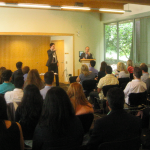From the Fletcher Forum.
Thirteen-year-old Zubair Rehman recently told members of Congress how his grandmother, Mamana Bibi, was “exploded to pieces” by a U.S. drone attack while picking okra for a family meal. A similarly tragic drone strike in Yemen last month killed a wedding party of fifteen. The Obama administration should take three measures to safeguard against such atrocities in the future. First, encourage Congress to develop guidelines for the use of drones. Second, create a drone court to authorize strikes and provide remedy for victims. And third, curtail Central Intelligence Agency involvement in drone warfare.
Are such measures really necessary? Advocates for the use of drones point out that they have effectively neutralized terror networks and leaders, such as Pakistan Taliban chief Hakimullah Mehsud. Mehsud was reportedly the mastermind of an attack on a CIA post in Afghanistan that killed several Americas (an event dramatized in Zero Dark Thirty).
But what about targets that fall into the ethical gray zone between killing Mamana Bibi and Mehsud? How do we decide who is a civilian and who is a “militant”? By what criteria are people designated legitimate targets? When is it legal to kill combatants outside active hostilities? How can we know when a killing is justifiable on grounds of self-defense, and when it is punitive?
To answer to these questions, we must recall why constitutional democracies distribute authority and responsibility among the branches of government. If the rule of law is to mean anything, it cannot be up to the president and those under his authority alone to decide who shall live or die. If the executive can enact laws and execute them, standing in arbitrary judgment over citizens, there can be no security of life and liberty.
This is how James Madison and the Founders of the United States Constitution understood the separation of powers. Madison also understood that the normal functioning of deliberative institutions would be impossible in times of war. That is why he said, as Obama noted in his May 23 speech at the National Defense University, “No nation could preserve its freedom in the midst of continual warfare.”
This was not the view of Bush-era officials who argued that permanent war should give the president exceptional powers, permanently. Obama can still distinguish his policies from those of the Bush administration by strengthening the separation of powers as part of the effort to phase out the “war on terror.” This would accomplish more than presidential guidelines that can be thrown away by the next incumbent.
First and foremost, the legislature, not the executive, should write the rules governing the legal use of force. The executive needs a new Authorization to Use Military Force (AUMF), one that clarifies the proper scope of presidential war-making powers in the specific context of drone warfare. It is not enough to apprise select congressional committees of executive decisions involving lethal force; legislators should spell out, after a public debate, rules governing the use of drones outside the battlefield wherever targets are not directly engaged in acts of terrorism.
The second step would be for Congress to authorize the creation of a drone court, as many legal experts have suggested. Such a court would oversee compliance with rules established by congress. Just as a judge can authorize an arrest or search warrant, drone courts could authorize the use of force in situations where there is ambiguity over the legality of a targeting decision. A court would also provide remedy for victims of unlawful uses of force.
The final step would be to halt drone campaigns by the CIA and place drones exclusively under control of the Armed Forces. Obama has been excessively deferential to the CIA. This is unfortunate, because the CIA does not act in the public domain. The CIA should be limited to providing intelligence—not fighting covert wars—because it is a creature of the executive, over which the deliberative branches of government have little control.
These three steps would compel the branches of government to work together in the fight against terrorism. The role of the courts and congress would expand as the level of threat diminished and the use of military force shifted from self-defense against imminent attacks to the disruption of potentially threatening networks. This will not debilitate the presidency, nor undermine U.S. security. On the contrary, it will strengthen the rule of law and prevent the further corrosion of the Constitution.
The separation of powers enables the United States to act deliberately, efficaciously, and lawfully in making decisions about morally significant actions involving life and death. It is at the heart of what gives the United States a strong constitution; vigilance in holding the government accountable is the price of these democratic values.

